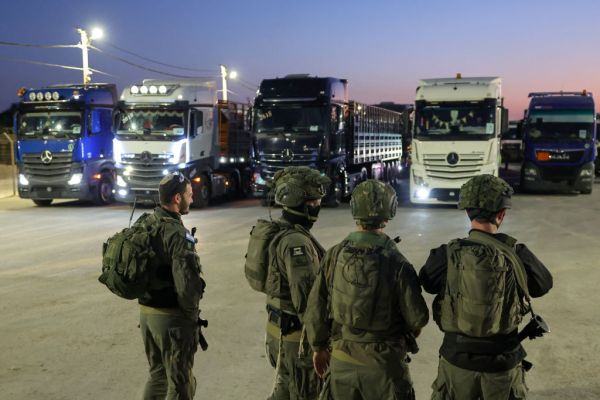Since November, the Biden administration has pursued a policy regarding Russia and Ukraine that can best be described as “deterrence by disclosure.” The policy has operated on several levels. First and foremost has been the disclosure of Russian troop movements and dispositions as well as the plans for provocations and false flag operations that could serve as a pretext for Putin’s war against Ukraine (and, more broadly, the West and the existing regional and global order). It has also been accompanied by leaks about interagency deliberations about sanctions and disclosures about agreements being negotiated with allies to suggest the more traditional “deterrence by punishment” to come should Russia recklessly launch a premeditated and unprovoked war in the center of Europe.
“Deterrence by disclosure” suggests that the administration is playing a weak hand but hoping to play it deftly. To be fair, the Biden team’s weak hand is a function of both difficulties it inherited (geography dictates that the fate of Ukraine will always matter more to Russia than to the U.S.) and those that its own actions created or exacerbated (rolling over the New START Treaty without any conditions, waiving Nord Stream 2 sanctions, granting Putin a summit with the president in the wake of serious cyberattacks on U.S. infrastructure conducted by Russian hackers, the disastrous Afghan withdrawal, and Biden’s own gratuitous comments about not sending Americans to fight in Ukraine and “limited incursions” by Russia into Ukrainian territory). By the time you read this, an assessment of the administration’s effort at “deterrence by disclosure” may be moot. Still, it seems worth taking a crack at evaluating the pros and cons of endeavoring to deter an adversary like Russia with public disclosures like the ones we have seen coming out of the current administration these past few months.
In the first instance, disclosure of Russian troop movements had some positive outcomes. It alerted the American and European publics to the fact that a political and military crisis was brewing. It signaled to Moscow that “we are watching you,” hopefully inducing some cautionary notes into internal Kremlin deliberations. Publicizing information about possible plots or provocations to provide a pretext or bogus casus belli had the impact of disrupting operational planning by the adversary (a lesson U.S. policymakers have learned over the past 20 years of disclosing plotting by violent Islamist extremists as part of U.S. counterterrorism policy). It also forced Vladimir Putin, Foreign Minister Sergei Lavrov, and other senior Russian officials to “deny” any intention of invading Ukraine. These denials serve several purposes in their own right. They heighten the costs for Putin in the ongoing information warfare between the U.S. and Russia by highlighting his mendacity if he commences military operations by increasing his reputational costs (not that he and his compatriots care much about reputation, given the transparent nature of many of these efforts and the insouciance with which he has treated revelations about the poisonings of Alexander Litvinenko, the Skripals, and Alexi Navalny). Moreover, they help in the battle for public opinion in allied countries, help ease the work of diplomats working on putting together an agreed-upon package of biting sanctions if deterrence fails, and will create a presumption of disbelief in Russian official statements once Putin’s war is underway.
Perhaps most important, deterrence by disclosure has bought time for the administration’s “relentless” and virtually non-stop diplomatic effort (for which it has gotten and generally deserves good grades). Moreover, there are some indications that U.S. disclosures have created some consternation in Moscow and, at the very least, produced the carefully stage-managed meetings of Putin with Foreign Minister Lavrov and Defense Minister Sergei Shoigu via which the Russians hoped to signal an intention to de-escalate and reinvigorate diplomatic efforts. That transparently false effort was quickly exposed by both Washington and its allies at NATO and in capitals.
This persistent diplomatic effort may turn out to be meaningless if, as President Biden has suggested, Putin has now made up his mind on war as the solution to the problems he had created by instigating the current crisis. But the efforts have allowed more lethal weapons to be transferred to the Ukrainian forces and some training to go on, making Ukraine a less inviting target than it might otherwise have been (although the decision to withdraw U.S. trainers has, sadly, undercut much of the administration’s deterrent messaging). Those steps have been accompanied by disclosure of the potential Ukrainian strategy of irregular warfare that would follow any initial Russian “victories” on the battlefield since most observers assume the better equipped and trained Russian army will make quick work of Ukraine’s military forces (an assumption that may or may not be warranted). Communicating the dangers of protraction, of the difficulties of waging a counterinsurgency war in a place that it took the USSR almost a decade to pacify after World War II can, perhaps, puncture the bubble of false optimism—what one political scientist has called “the strategist’s curse”—that may have inclined Putin to believe that a quick and splendid little war in Ukraine will bring him the same kind of political benefits that the largely bloodless seizure of Crimea did in 2014.
There are, however, very serious negative consequences to relying so heavily on deterrence by disclosure. First, making public information gleaned from sensitive intelligence inevitably runs the risk of giving away sources and methods. Although policymakers may judge that it is a worthwhile gamble to give away future intelligence in exchange for stopping a war now, it is impossible to calculate the potential costs for crisis management in the future. The constant warnings also run the risk of appearing to “cry wolf” too often. There already have been visible cracks in the alliance as both Ukrainians and some Europeans have offered less dire assessments. To this point, the administration has handled this complication reasonably well, but if this turns out to be a longer crisis in which Putin pursues a “no war, no peace” strategy of managed tensions, there could well be a price to be paid in allied unity over time. The disclosures also sometimes seem to be playing into Russia’s hands in the information/political warfare space. The constantly ringing alarms allow Putin to play the “strongman” card to the hilt and remind the Russian populace, “Look how much the West fears me” (with the subtext “and so should you!”). It also cedes the initiative to him and allows him to set the tempo of the crisis by dialing the military pressures up or down (and seeking to accentuate the administration’s discomfort when it lowers the temperature by pointing out that the U.S. and its spokespeople are “hysterical.”). Finally, by emphasizing that Putin has chosen war, disclosing the array of forces that have been positioned along the border and speculating about a multidirectional assault on Ukraine with a possible long-term occupation of significant parts of the country, the Biden administration has, perhaps, desensitized some proportion of the American and European public to any kind of land grab or “minor incursion” that is less than the full Monty. If, as it turns out, Putin’s objectives in this crisis are more in line with what he has done in the past than the large-scale operation that many are now forecasting, it may be harder to mobilize opposition in the West than it otherwise would have been.
Deterrence by disclosure may be the form of deterrence that seems safest when one is playing a weak hand. But what Thomas Schelling described as “the diplomacy of violence”—the competition in risk-taking that accompanies coercive diplomacy—always requires “the risk that leaves something to chance.” Inculcating in the mind of the adversary that starting down the road of conventional aggression creates the potential that things will get out of hand and escalating to a level that nobody wants is essential to successful deterrence. Putin’s recent decision to hold a massive exercise of Russia’s nuclear forces is just that kind of invocation of prospective dangers. Against that background, deterrence by disclosure seems like weak tea indeed.
Eric S. Edelman is former U.S. ambassador to Finland and Turkey and was the under secretary of defense for policy (2005-2009). He is counselor at the Center for Strategic and budgetary assessments and practitioner in residence at the Johns Hopkins School of Advanced International Studies (SAIS).





Please note that we at The Dispatch hold ourselves, our work, and our commenters to a higher standard than other places on the internet. We welcome comments that foster genuine debate or discussion—including comments critical of us or our work—but responses that include ad hominem attacks on fellow Dispatch members or are intended to stoke fear and anger may be moderated.
You are currently using a limited time guest pass and do not have access to commenting. Consider subscribing to join the conversation.
With your membership, you only have the ability to comment on The Morning Dispatch articles. Consider upgrading to join the conversation everywhere.